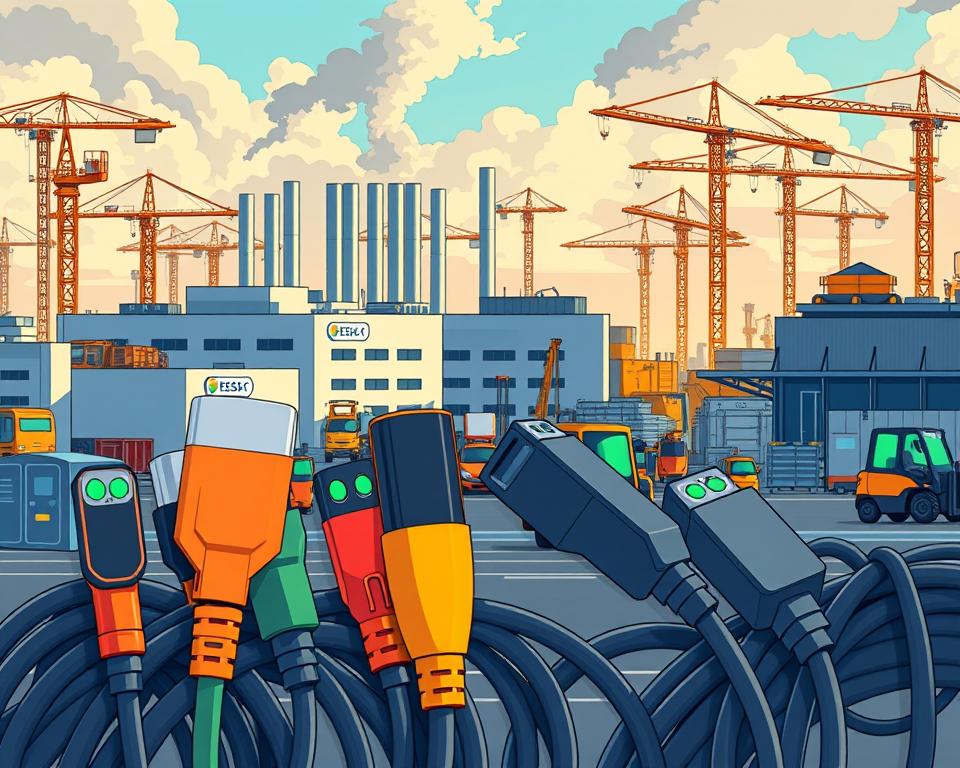Renowned EV Charging Cable Manufacturers for Your Electric Vehicle
EV adoption is booming, with the demand for reliable and fast charging solutions increasing sharply. As of now, leading companies have been at the vanguard of this change, providing high-quality charging infrastructure. Southwire, for instance, entered the market in 2014 and excels, garnering 1000+ five-star reviews and 75 years of experience in the electrical construction industry.
The upswing in electric vehicle adoption necessitates the need for durable, rapid, and safe EV Charger Manufacturers. Top manufacturers are innovating to address changing requirements, offering solutions that enhance the overall charging experience.
Knowing the distinctions between various charging solutions is crucial for making informed decisions. Quality charging infrastructure directly influences vehicle performance and customer satisfaction.
Core Lessons
- Key suppliers deliver top-tier cables enhancing lifespan and protection.
- EV market expansion drives need for high-efficiency chargers.
- Leading companies innovate to meet the evolving needs of electric vehicle owners.
- Premium cables enhance both charge rate and vehicle function.
- Investing in quality charging infrastructure is beneficial in the long run.

Why High-Quality EV Cables Matter
As more drivers choose EVs, the significance of top-grade EV charging cables is immense. The efficiency, safety, and reliability of electric vehicle charging systems depend heavily on the quality of the charging cables used.
How EV Charging Tech Has Advanced
Charging tech for EVs has evolved rapidly, with a focus on faster charging speeds and improved safety features. Today’s EV charging cables are built for these requirements, incorporating high-grade materials and advanced designs to minimize energy waste and maximize transfer rates.
Why Quality Matters in EV Charging Infrastructure
Premium cables enhance both safety and functionality in EV systems. Durable features, such as weather resistance and flexibility in extreme temperatures, ensure reliable operation across various environments. Additionally, meeting standards and adherence to industry guidelines are crucial in guaranteeing safe operation.
| Key Features | Benefits |
|---|---|
| High-grade build quality | Reduced energy waste |
| Robust durability | All-weather reliability |
| Standards adherence | Rigorous safety requirements met |
| Maintainability | Repairable design for longevity |
Products from Aichie Tech Electronics pass The Cable Lab’s stringent tests. By opting for serviceable Portable EV Charger Manufacturer, owners save money long-term through repairs, reducing waste and protecting the planet.
Top EV Charging Cable Manufacturers in China
A surge of cable makers in China supports the EV boom. These companies are crucial in supporting the expanding electric vehicle (EV) market, offering premium charging cables designed for different applications.
Wottz – Pioneers in EV Cables Since 2014
Wottz has established itself as a prominent player in the EV charging cable market since 2014. They offer a range of cables that meet the specific requirements of EV charging systems, from Mode 1, 2, 3, and DC Fast Charging (Mode 4).
Aichie Tech Electronics – 75 Years in Electrical Solutions
Aichie Tech Electronics leverages 75 years of electrical expertise in its EV cables. Their products are designed to meet the demands of both domestic and commercial EV charging infrastructure.
Other Notable Manufacturers in the Market
Companies developing flexible, weather-resistant and high-performance cables are also notable. These include Type 1 & 2 connector experts, as well as brands innovating in cable durability and adaptability.
A Guide to EV Cable Types
As electric vehicles become increasingly popular, understanding the various types of EV Charging Cables is crucial for optimal charging experiences. Different cables suit different charging needs. The variety in EV charging infrastructure demands a closer look at the different cable types available.
Type 1 vs Type 2 Explained
SAE J1772 (Type 1) and Mennekes (Type 2) are the main global standards. Type 1, also known as SAE J1772, is North American standard, while Type 2, or Mennekes, is the standard in Europe. The choice between these cables depends on the vehicle’s connector type and the charging station’s compatibility. Type 2 cables often support higher charging capacities, making them suitable for faster charging.
AC Level2 vs DC Fast Charging
Level 2 AC cables charge faster, up to 19.2 kW. DC Fast Charging cables, on the other hand, provide rapid charging by converting AC power to DC within the charging station, delivering rapid fill-ups. These cables are essential for long-distance EV travel, letting EVs charge in minutes.
Portable and Tethered Cable Options
Portable EV charging cables, such as “Granny chargers,” offer flexibility by allowing owners to charge their vehicles from standard household outlets. Tethered cables are attached permanently, providing a convenient but less flexible charging solution. The choice depends on the owner’s charging needs and preferences.
When selecting an EV charging cable, factors such as cable length, charging speed, and compatibility with the vehicle are crucial. For instance, portable charging cables range from simple L1 cords to full L2 kits. Vehicle-to-load (V2L) cables represent an emerging category, enabling EVs to power external devices.
- Flexible granny chargers and L2 units suit various needs.
- Tethered cables are permanently attached to charging stations, limiting flexibility but eliminating the need for personal cables.
- Lengths vary from 5 m to 50 m—choose wisely.
Key Features of High-Quality EV Charging Cables
Premium cables stand out for durability, safety, and performance. These features are vital to safe, efficient charging.
Durability and Weather Resistance
Cables must withstand rain, sun, and cold. Manufacturers like Wottz and Southwire use RoHS-compliant recyclable compounds, ensuring they perform in harsh climates. Their serviceable design facilitates easy maintenance and promotes recycling.
Flexibility and Ease of Use
Cables need to flex yet remain tough. High-quality EV charging cables are built for easy handling without sacrificing strength. This flexibility is combined with rugged construction for lasting performance.
Regulatory Approvals
Approved safety marks ensure reliable performance. They ensure their products meet or exceed standards such as IEC62196 for connectors and UL2594 in North America. Rigorous third-party testing evaluates electrical safety, mechanical durability, and environmental resistance.
| Certification | Description | Region |
|---|---|---|
| IEC62196 | Connector safety standards | International |
| UL2594 | Standard for electric vehicle supply equipment | North America |
| ROHS | Restriction of hazardous substances | International |
By focusing on these key features, manufacturers can provide EV charging cables that not only meet the highest quality and safety standards but also enhance the overall user experience.
Next-Gen Charging Cable Tech
The latest developments in EV charging cable technology are revolutionizing the way we charge our vehicles, with a focus on speed, improved signal integrity, and sustainable compounds.
Liquid Cooling for Rapid EV Charging
Liquid-cooled charging cables are emerging as a key technology for ultra-fast charging, enabling electric vehicles to charge at significantly higher speeds without overheating.
Signal-Boosting Contact Designs
Hyperboloid contact points improve electrical connection, ensuring reliable and efficient data transfer during the charging process.
Sustainable and Recyclable Materials
Leading manufacturers are prioritizing sustainability in their cable designs, minimizing ecological footprint with RoHS-compliant, serviceable builds. For instance, companies like Aichie Tech Electronics and Wottz are adopting serviceable design philosophies and RoHS compliance to minimize waste and promote recycling.
The industry’s shift towards sustainability includes the use of TPU jackets, avoidance of hazardous substances, and the development of take-back programs for end-of-life disassembly and material recovery.
Buyer’s Guide to EV Charging Cables
Selecting the proper cable ensures optimal performance. To make an informed decision, consider several key factors.
Connector Compatibility
Verify your car’s inlet and cable plug match. Your vehicle’s onboard charger capacity sets the upper limit for AC power.
Determining the Optimal Cable Length
Choose a cable length that suits your charging needs. A longer cable adds reach at the cost of extra weight.
Considering Power Requirements and Charging Speed
Match your cable’s power handling to your vehicle’s capabilities. Standard Level 2 home charging operates at 7.2 kW, but some vehicles support up to 19.2 kW with appropriate electrical service.
By considering these factors, you can select an EV charging cable that meets your needs and enhances your overall charging experience.
Final Thoughts on Premium EV Cables
As the electric vehicle market continues to expand, the importance of quality charging infrastructure cannot be overstated. Choosing cables from Wottz or Aichie Tech Electronics provides long-term value and reliability. Their serviceable designs enable repairs over replacements to cut waste. This approach supports eco-friendly EV use.
Premium cables offer certification, future proofing, and reliability.

